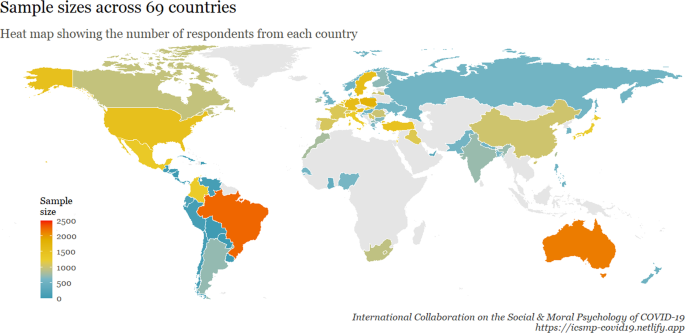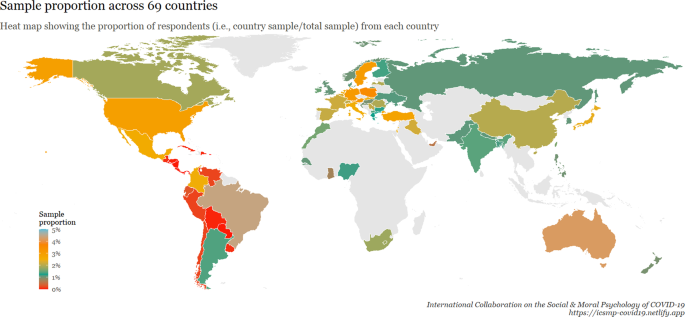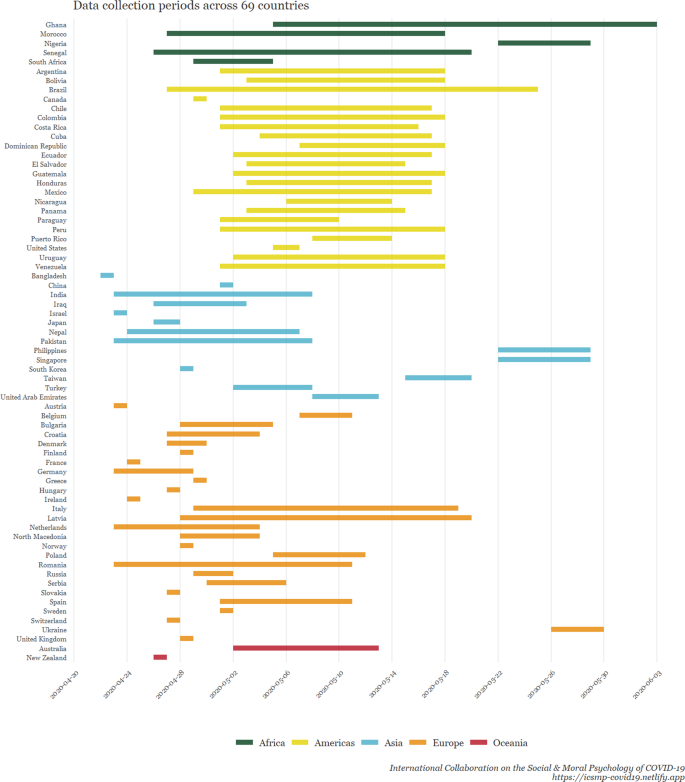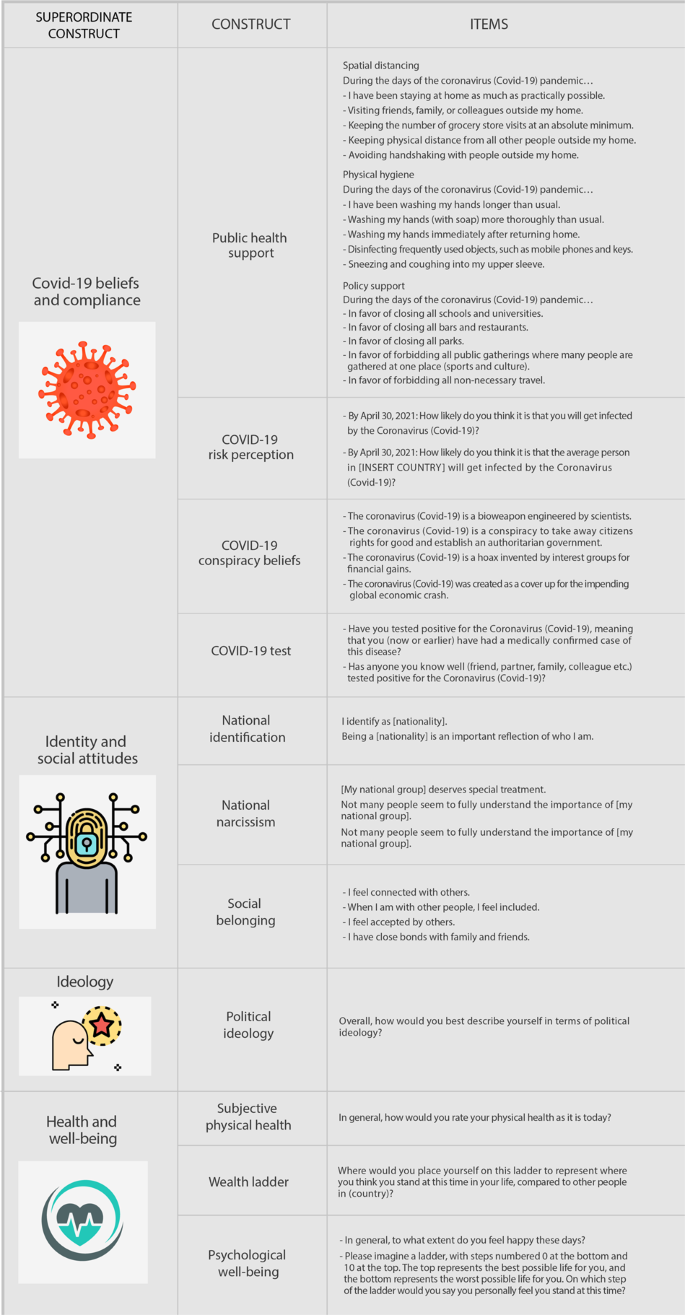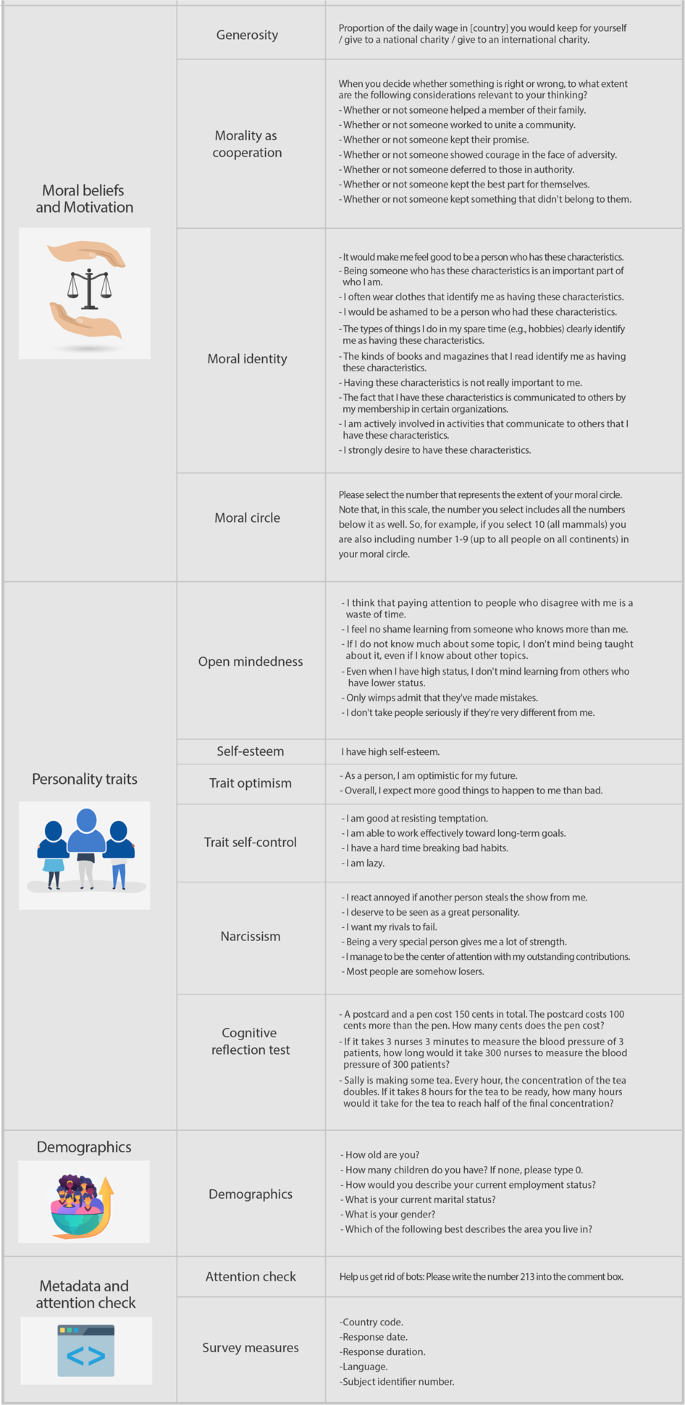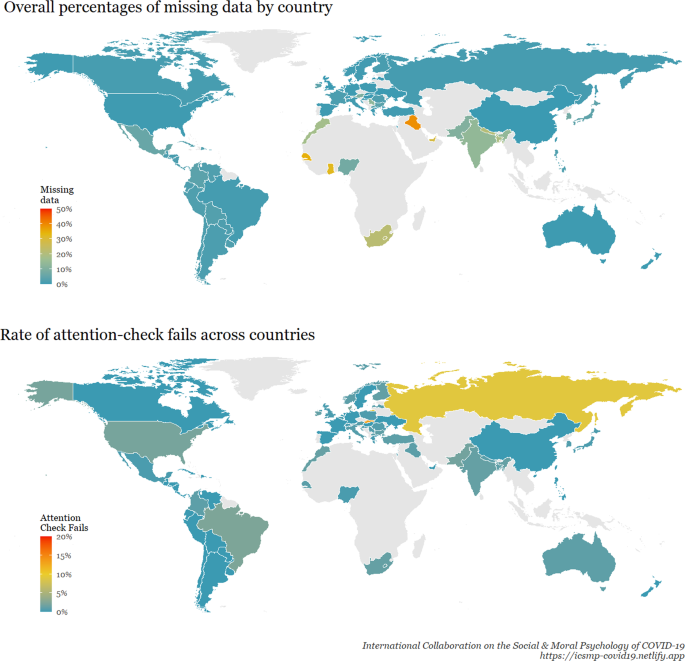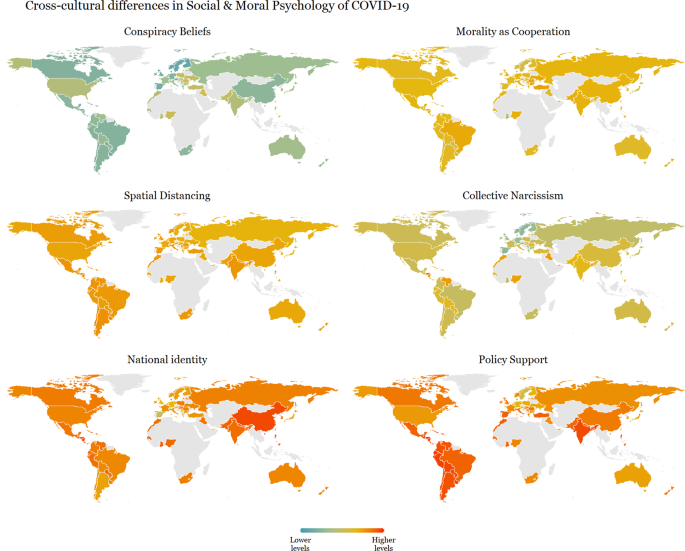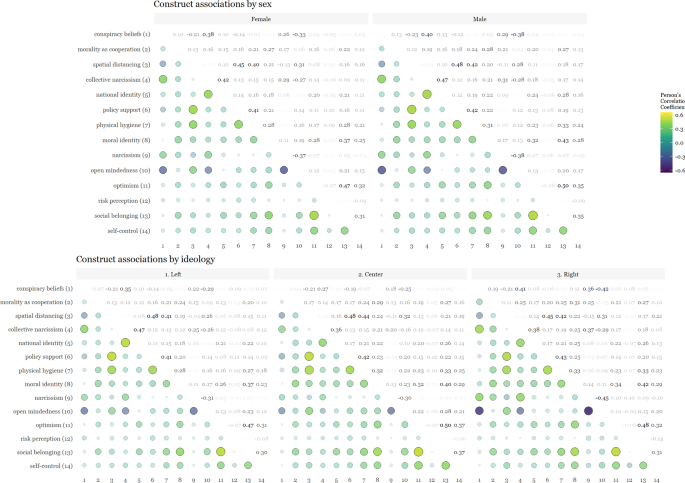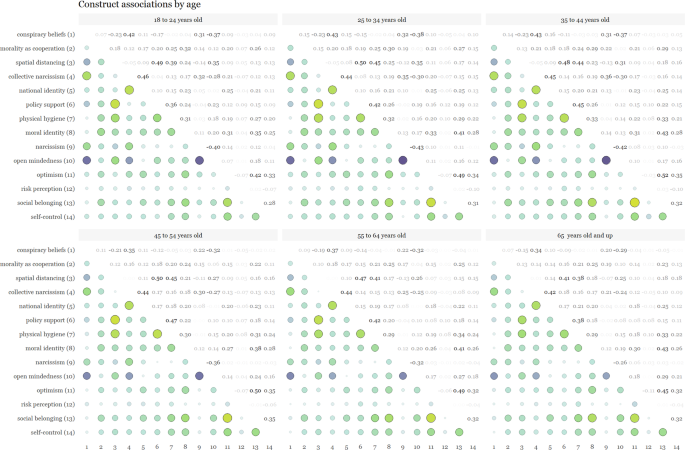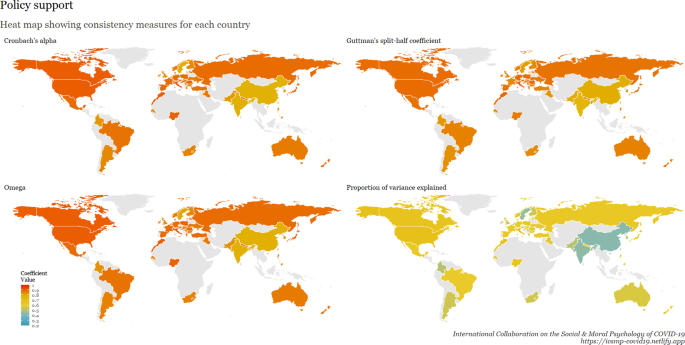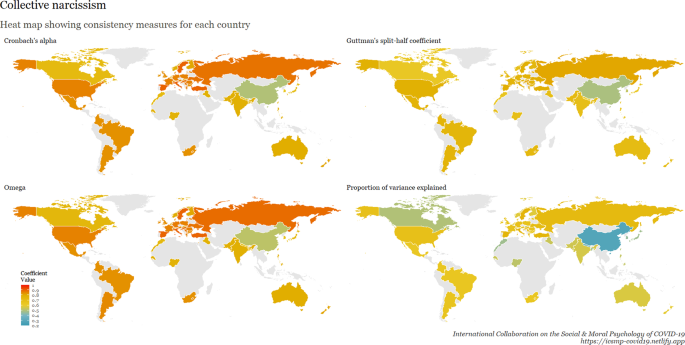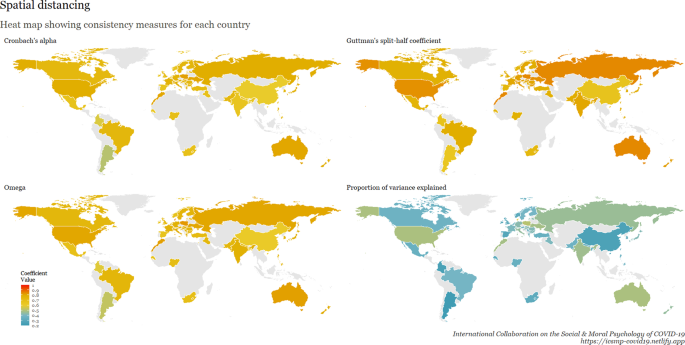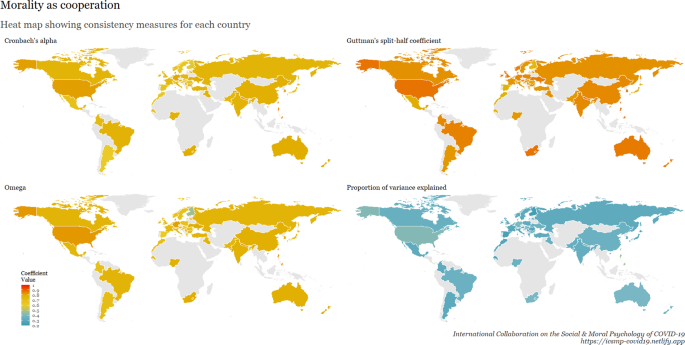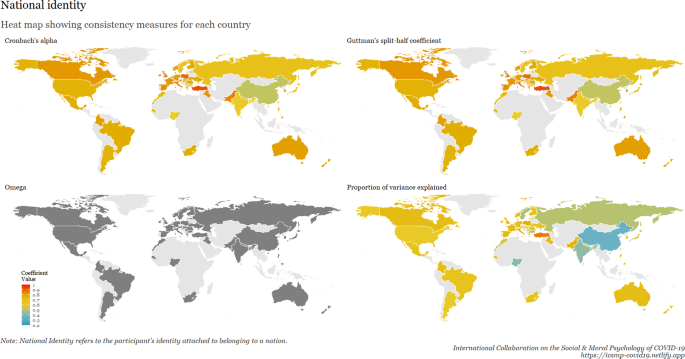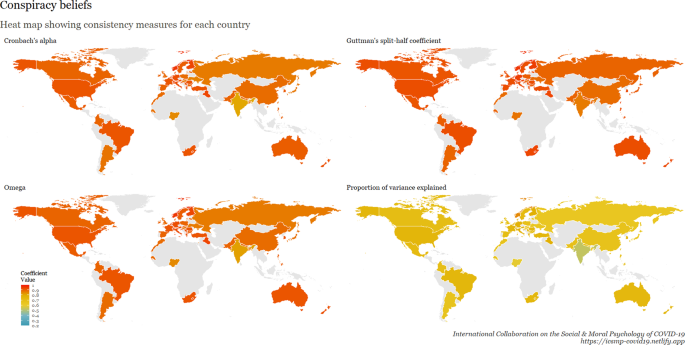Social and moral psychology of Covid-19 across 69 countries
Background & Summary
Well over two years after the official outbreak1, it is evident that the COVID-19 pandemic has affected all domains of human life, including the economic and social fabric of societies2 as well as people’s physical and mental health3. At the time of writing, the world reached 850 million confirmed infections and up to 18 million deaths4. The detrimental effects of the pandemic extend beyond physical health with evidence of increased stress levels5 and suicide rates6, along with deterioration of general well-being7. Such findings reflect the cautionary warnings by Taylor8 that the psychological and societal effects are “likely to be more pronounced, more widespread, and longer-lasting than the purely somatic effects of the infection”8, p.23.
In the early stages of the pandemic, when vaccines were not yet available, governments introduced non-pharmaceutical interventions to reduce the spread of the SARS-CoV-2 virus9. Various contact-restricting policies (e.g., stay-at-home recommendations, curfews, police hours, partial or complete lock-downs) were enacted, and citizens were advised to adhere to public health recommendations (e.g., hand washing, face masks, and spatial distancing). It quickly became clear that behavioural science had a major role to play10.
On April 11th, a team of researchers launched a call for international collaboration in social and moral psychology. The initiative quickly gained momentum, gathering a consortium of over 250 academics worldwide. The aim of this project was to collect data from as many countries as possible to serve as a public good for the scientific community by allowing future research to draw on this broad database collected during this early phase of the COVID-19 pandemic. The survey, developed by the initial team, was circulated among the national teams, who provided feedback, translated it into 32 languages, and disseminated it online. The project concluded with responses from a total of 51,404 participants from 69 countries, 77 samples, between April 22nd and June 3rd, 2020.
A key goal of the project was to test the hypothesis that national identity predicts support for public health measures during the COVID-19 pandemic, which has since been confirmed11,12. In addition to collecting variables to test this hypothesis, we collected data on a variety of other social and moral constructs to make of our multi-country large-scale survey a rich resource for future research. The survey focused on the following areas: on a) COVID-19 beliefs and compliance behaviours (COVID-19 public health support, COVID-19 risk perception, COVID-19 conspiracy beliefs, and COVID-19 testing behaviour); b) identity and social attitudes (national identification, national narcissism, and social belonging); c) ideology (political ideology); d) health and well-being (subjective physical health, a wealth ladder ranking, and psychological well-being); e) moral beliefs and motivation (generosity, morality as cooperation, moral identity, and moral circle); f) personality traits and dispositions (open-mindedness, self-esteem, trait optimism, trait self-control, narcissism, and cognitive reflection); and g) demographic variables (i.e., sex, age, marital status, number of children, and employment status).
Using this dataset, project team members have pre-registered a variety of secondary hypotheses (see icsmp-covid19.netlify.app/preregistration), several of which have already been published11,12,13,14,15,16,17,18,19,20,21,22,23. In this paper, we present the complete ICSMP datasets to facilitate its findability, accessibility, interoperability, and reuse (FAIR;24,25) and maximize its educational impact26,27,28.
Methods
When possible, we used articles published in Nature Scientific Data presenting social sciences data as blueprints5,29. Given the urgent call for COVID-19 research, this study received an umbrella ethical approval from the University of Kent (see osf.io/ce638) but also complied with local ethics, norms, and regulations in the countries where the data were collected.
Participants
A total of 51,404 individuals from 77 samples across 69 countries participated in our survey. The inclusion criteria were the following: being 18 years of age and older, and giving informed consent (although researchers were encouraged to, ideally, recruit representative samples regarding age and gender). Data were collected between April 22nd and June 3rd, 2020. Figure 1 displays where the data were collected, coloured according to national sample size. Figure 2 displays the proportion of respondents in relation to the full sample. Figure 3 shows when the data were collected in each country.
A world map visualizing the number of participants in each surveyed country. Note: This heat map shows the number of respondents from each country. The gray areas are the countries that are not covered by the data, and the colour scale shows the size of the sample in accordance with the scale on the lower left side.
International Collaboration on the Social and Moral Psychology of COVID-19: Investigated constructs, items and variables.
Demographic variables across countries are summarised in several tables: Tables 1, 2 show the number of participants, the mean proportion of non-missing ‘valid’ answers, and age. Tables 3, 4 illustrate the distribution of gender; Tables 5, 6 show employment status; and Tables 7–9 show marital status and number of children. When multiple samples were collected within the same country, data were split into numbered subgroups (e.g., for Brazil, which has three samples, they were flagged as Brazil_1, Brazil_2 and Brazil_3). Note that in the tables above, we kept country subsamples separated to highlight they were collected by different teams, often using different sampling methodologies or languages, which impact their characteristics (e.g., representativeness).
For the most part, participants were recruited via professional survey research companies and were incentivised to participate. In countries that, to our knowledge, did not possess polling infrastructure30, incentivising participants was not feasible. To collect data in these countries, leaders of national teams relied on online volunteers recruited via media appeals, mailing lists, advertisements on news aggregators, local communities and bloggers, and private messaging apps such as WhatsApp or WeChat.
Materials
The measures we used are illustrated in Figs. 4, 5 along with the specific items listed for each measure. In most cases, participants’ responses were collected on a scale from 0 = ‘strongly disagree’ to 10 = ‘strongly agree’, with 5 = ‘neither disagree nor agree’. In some cases, when more appropriate, we used other response scales (e.g., the generosity measure, where a 0–100% response scale was applied to hypothetical donations). In total, we collected 98 unique variables and meta-data. To ensure participants’ anonymity, no data that would allow their identification were collected.
International Collaboration on the Social and Moral Psychology of COVID-19: Investigated constructs, items and variables.
International Collaboration on the Social and Moral Psychology of COVID-19: Investigated constructs, items and variables.
COVID-19 Beliefs and compliance
Four constructs: COVID-19 public health support, COVID-19 risk perception, COVID-19 conspiracy theory beliefs, and COVID-19 testing behaviour. The public health support construct, in turn, is composed of three measures: spatial distancing, physical hygiene, and policy support. These are ad-hoc scales that we developed ourselves.
Identity and social attitudes
Three constructs: national identification31, national narcissism32, and social belonging33.
Ideology
One construct: political ideology. Participants self-reported their political orientation according to a single item on a scale from 0 (“Very left-leaning”) to 10 (“Very right-leaning”). This measure has been shown to account for a significant proportion of the variance in voting intentions in American presidential elections between 1972 and 200434 and 201635,36,37. In fact, using a single-item scale to measure political ideology has been a common practice in political psychology literature, providing substantive evidence for the validity of the measure both across national and international research38,39. However, even if the symbolic ideology can be a useful and parsimonious instrument to study political attitudes, when interpreting results, users should be attentive to the political and cultural applicability, psychometric validity, and generalisability of measures of political ideology40,41,42.
Health and well-being
Three constructs: subjective physical health, wealth ladder, and psychological well-being. Each of these scales relied on well-validated instruments43,44,45.
Moral beliefs and motivation
Four constructs: generosity46, morality as cooperation47, moral identity48, and moral circle49.
Personality traits
Six constructs: open-mindedness50, self-esteem51, trait optimism52, trait self-control53, narcissism54, and cognitive reflection55.
Demographics
Six questions: age, number of children, employment status, marital status, gender, and urbanicity.
Metadata and attention check
An attention check was used to mitigate negative impact on data quality from potential non-human responses and the likelihood of biasing data and subsequent analysis of low base-rate outcomes—such as endorsement of COVID-19 conspiracies. We collected typical questionnaire metadata (e.g., start, record, and end dates, duration, and language). In addition, we created an internal participant ID, added ISO2 and ISO3 country codes, and sample representativeness.
Translation
The survey instrument was drafted in English and translated into other languages using the standard forward-backward method (i.e., members of national teams were advised to split members into forward-translating the survey into the local language and back-translating it into English, and then have the two groups discuss and resolve discrepancies). In total, the survey instrument was translated into 32 languages, including adaptations of region-specific dialects or vernaculars. Specifically, from English into Arabic, Bengali, Bulgarian, Croatian, Danish, Dutch, Finnish, French, German, Greek, Hebrew, Hungary, Italian, Japanese, Korean, Kurdish, Latvian, Macedonian, Mandarin simplified, Mandarin traditional, Nepali, Norwegian, Polish, Portuguese, Romanian, Russian, Serbian, Slovak, Spanish, Swedish, Turkish, and Ukrainian (see osf.io/tfsza at sub-folder Translations).
Data cleaning
We received individual data files from each national team. To merge these raw data, minor modifications were introduced, which we delineate in this section. First, we renamed columns to match across data sets, reordered variables alphabetically, and standardised variable labels. Furthermore, all missing values and values denoting the absence of a response were converted to NAs (not available). When ambiguous date formats were found (e.g., on start date, end date, and record date), we manually specified the correct format and standardised them. At the second stage, we introduced multiple modifications to clean the data for research. Some modifications were introduced to every national data set, while others were introduced to specific national data sets (both of which are thoroughly reported in the Data Records section). To each national data set, we recoded the attention check (attcheck) into pass (1) or fail (0); standardised generosity items (generosity1–3), recoded CRT items into intuitive (2), correct (1), and incorrect (0); converted the number of children (children) into a variable with a fixed range from zero to ten or more; recoded all participants declaring being older than 100 years old as 100; and we excluded all duplicates (i.e., in case multiple participants were recorded with identical inputs within a national database, only the first input was retained).
Data Records
All materials associated with the ICSMP COVID-19 project can be found on the project’s repository (comprising five folders) hosted by the Open Science Framework (OSF, https://doi.org/10.17605/osf.io/tfsza)56,57. The folder named Code includes an R Markdown document (ICSMP official data.Rmd; osf.io/dwpng) that loads multiple data files (from each national team), cleans them up, merges them into a single data file, generates a data-driven code-book, and saves all outputs. It also includes a reproducible report with all reported numbers, analyses and graphs in this article (Analyses-SciData.html; osf.io/s5c4p; Analyses SciData.Rmd; osf.io/9suyb). The folder named Data includes three sub-folders. The Raw data sub-folder contains the original and unmodified data files from each national team (country data files.zip; osf.io/dqmut). The sub-folder named Cleaned data contains the merged and cleaned dataset, which is provided in a non-proprietary (ICSMP_cleaned_data.csv; osf.io/ypkrc) and a labelled (ICSMP_cleaned_data.sav; at osf.io/8tyj9) file formats. In addition, we included in a sub-folder a dataset that removes observations failing the attention check or filled out less than 50% of the items, both in a non-proprietary (ICSMP_cleaned_data_nobots.csv; osf.io/98fex) and a labelled (ICSMP_cleaned_data_nobots.sav; at osf.io/3yjga) file formats. The Metadata sub-folder provides a thorough itemised description of the data cleaning process in both text (Data Cleaning.docx; osf.io/7udpt) and human-readable change-log (human-readable change log ICSMP.xlsx; osf.io/fydx2).
We also provide a data-driven codebook detailing how each measure was collected—e.g., listing variable names, variable labels, and label values (dt.codebook.xlsx; osf.io/ecva2). The IRB folder contains both the Internal Review Board Ethics application (ICSMP Kent Ethics application full.pdf; osf.io/xt9gr) and Ethics approval (ICSMP Kent Ethics approval.pdf; osf.io/ce638). The folder Sample Type & Representativeness includes the documentation for an internal survey conducted with national team leaders about the employed survey methodology for the data provided (Sample Type & Representativeness.zip; osf.io/fj5xn). The folder Survey Instrument contains the initial English version of our survey instrument along with its Qualtrics.qsf for reproducibility (Survey Instrument.zip; osf.io/nf48q). In the sub-folder Translations, we archived all 32 translated survey instruments along with a report on the languages of conducted surveys per country (i.e., several countries had their surveys in multiple languages per country; Country and language.xlsx; osf.io/wj7d2).
Potential for future research
The data contains four measures of COVID-19 beliefs and compliance, 17 social and moral psychological constructs, and six sociodemographic characteristics, amounting to 27 socially-relevant variables. To quantify the potential of this dataset—and assuming a typical research paper uses between three to five key main constructs plus sociodemographics and controls—we calculated the number of combinations of 17 constructs, taken three, four, and five at a time, yielding a grand total of 9248 possible unique designs. As a demonstration of the broad scope of the ICSMP data, published studies cover a broad range of psychological disciplines, including social psychology13,14, cognitive psychology15,17, political psychology16, moral psychology16,18, economic psychology19 and health sciences20, among others. They explore different populations in reference to the COVID-19 pandemic in terms of age (e.g., older adults see21, marital status19 or nationality (e.g., for a study on the Spanish population, see;22 for Swedish and Chinese population see23), and other socio-demographic characteristics. These all attest to the great potential of the ICSMP data to inspire further research. In sum, the present dataset affords numerous opportunities for cross-cultural research on a plethora of hypotheses. We encourage researchers who consider reusing ICSMP data to examine the list of pre-registrations before beginning a new project so as to avoid duplication (see icsmp-covid19.netlify.app/preregistration).
Data visualisation interface
In addition to the raw data, a dedicated Web application was developed to provide a general overview of the dataset (icsmp.shinyapps.io/icsmp_covid19). The application is based on an R shiny server (rstudio.com/products/shiny), together with the leaflet58 and ggplot259 graphical libraries to generate dynamic plots. All the generated figures can be exported as .png files, and all tables can be exported as .csv files. The Web application allows easy and dynamic generation of illustrations like the figures with maps for each construct with zoomable world maps and static figures and plots for sample and country characteristics. In addition, all tables are embedded with dynamic features for sorting and filtering. To make it more accessible for the readers, both tables and figures are downloadable. The Shiny app has two tabs giving general information about the project and the international consortium. The first tab contains sample descriptions such as sample size, missing data, and attention checks for each country with a Gantt chart showing the dates of data collection. The second tab displays world maps of spatial distancing, policy support, national identity, conspiracy beliefs, national narcissism and morality as cooperation as well as all tables reported in dynamic formats.
Technical Validation
To support the technical quality of the dataset, we conducted an analysis to showcase its reliability (and its diverse applicability to research questions in social sciences and beyond). For completeness, in the analyses that follow, we examined all samples-including those with very few observations, such as Puerto Rico (N = 2), Brazil_3 (N = 6), and Panama (N = 12).
We evaluated the adopted survey methodology utilised by national teams by conducting an internal survey to ensure the accuracy of reported sample types. The inspection showed that 28 samples were quota-based nationally representative samples (36%), 6 used post hoc weights to achieve an approximate level of national representation (8%) which nonetheless should be seen as convenience samples, and 43 were convenience samples (56%), many of which were from low and middle-income countries60. We codified the results of this survey into the cleaned data as the variable ‘sample_coding’ and present a summary in Table 10. National representativeness for the 28 quota-based samples relate to an approximation of the demographic characteristics of age and gender only for each country.
Regarding individual-level data quality, Fig. 6 shows a world map of the 69 countries from which data were collected, coloured according to overall percentages of missing data (overall mean = 6.0%). Overall, 95.6% of participants had less than 50% missing data, 92.8% participants had less than 10% missing data, and 24.7% of participants had 0% missing data. Another indicator of data quality is the rate of attention check fails per country. On the last screen of the survey, participants were given the following instructions: “Help us get rid of bots: Please write the number 213 into the comment box.” Participants who wrote “213” were coded as passing the attention check, participants who wrote anything else were coded as failing the attention check, and those who did not reach this screen of the survey were coded as missing data. Figure 6 also shows (bottom plot) a world map coloured according to the rate of attention-check fails across countries. Overall, 90.1% of participants passed the attention check (1.0% failed), and 8.0% did not reach the final screen with the attention check.
Data quality indicators for each surveyed country. Note: The percentage of missing data considered all the questions in the survey (i.e., all sociodemographics and psychological scales”). We calculated, for each country, the mean of the participants’ proportion of missing data across all survey questions, including sociodemographics (this information is also provided in our reproducible report of Fig. 6, where the R code is provided).
The full dataset presents N = 51,404 cases across 69 countries (from 77 samples, 28 of which are quota-based nationally representative), with an average sample size of 745 (SD = 549) and a proportion of valid answers of 95%. The mean age of respondents was 42.93 (SD = 16.04) years, and 50.9% were women (44% males, 0.3% others, and 4.8% unreported). The employment status breakdown shows 44.8% employed full-time, 10.6% part-time, 8.1% unemployed, 10% students, 10.1% retired, 11% other, and 5.3% unreported. The overall marital status shows 33% of respondents were single, 18.7% in a relationship, 42.7% married, and 5.5% unreported. The majority of our participants reported having no children (41.6%), with 16.7% having one child, 20.1%, 9.2%, and 3.9% with two, three and four children, respectively, and 1.7% had five or more children (6.9% unreported). We break down these aggregated results per country. Tables 1, 2 show the number of cases and valid answers, Table 3,4 summarises the distribution of sex, Tables 5, 6 display employment status, and Tables 7–9 illustrate both marital statuses and the number of children.
We also examined cross-cultural differences in conspiracy beliefs, morality as cooperation, spatial distancing, national narcissism, national identification, and policy support for preventative measures across 69 countries in Fig. 7. Additionally, we showcase patterns of associations between these moral and psychological constructs across gender, ideology and age in Figs. 8, 9. For the association pattern analysis, we excluded samples with less than 490 respondents as recommended for stable correlations61, as well as for the subsequent consistency measure analysis.
Cross-cultural differences in Social & Moral Psychology of COVID-19 across 69 countries. Note: Each world heat map in the figure shows the means score, at the country level, for constructs in the survey. Conspiracy Beliefs - participant’s beliefs in conspiracy theories regarding COVID-19; Morality as Cooperation - participant’s moral concern based on the morality-as-cooperation theory; Spatial Distancing - participant’s support for spatial distancing as a strategy against COVID-19; Collective Narcissism - participant’s narcissism, i.e., an inflated view regarding their ingroup (in this research we focused on nationality); National Identity - participant’s identity attached to belonging to a nation; Policy Support - participant’s support to public policies (e.g., closing parks or schools) as a strategy against COVID-19.
Cross-cultural differences in associations of Social & Moral Psychology of COVID-19 across sex and ideology in 69 countries.
Cross-cultural differences in associations of Social & Moral Psychology of COVID-19 across age in 69 countries.
To examine internal consistency for the main scales, we calculated Cronbach’s Alpha, Omega, Guttman split-half reliability, and proportion of variance explained by a unidimensional factor. This table is available at osf.io/ed7yg and shows indices of internal consistency by country for measures of conspiracy beliefs, morality as cooperation, spatial distancing, national narcissism, national identification, and policy support for preventative measures, respectively. We found that the spatial distancing construct, on average, has the lowest Cronbach’s alpha, followed by morality as cooperation. On average, conspiracy beliefs have the highest Cronbach’s alpha, followed by policy support. These patterns hold for the Omega measures, but when considering Guttman’s split-half reliability, collective narcissism and national identity yield the lowest values. Figures 9–15 show these patterns visually.
Cross-cultural differences in Internal Consistency Coefficients (Cronbach’s alpha, McDonald’s Omega, Guttman Split-Half), and variance explained of Social & Moral Psychology Constructs in 69 countries. Note: internal consistency typically refers to correlations between different items on the same test to evaluate the extent to which latent indicators comprising the scale measure the same construct.
Usage Notes
The datasets are shared, cleaned, and ready for analysis. We recommend that interested researchers use the cleaned version of the data (available at https://doi.org/10.17605/osf.io/tfsza)56. The use of the labelled data is also suggested for convenience as it has all variable levels encoded, thus eliminating the need to consult the codebook when using the.csv format.
The Data were imported and cleaned using the R software for statistical analysis62 and packages readr63, haven64, readxl65, dplyr66, psych67, htmltools68, mime69, xfun70, labelled71, sjlabelled72, codebook73, lubridate74.
As previously noted5, those wishing to approximate national representativeness can apply the appropriate survey weights to demographic and countries of interest when random sampling is used (e.g., sex: https://ourworldindata.org/gender-ratio; age: http://data.un.org/Data.aspx?d=POP&f=tableCode%3A22; education: https://ourworldindata.org/global-education; marital status: https://ourworldindata.org/marriages-and-divorces).
To minimize misclassification of text-based responses to the cognitive reflection test (CRT) and the attention check, we used multiple steps of data cleaning using REGEX (regular expressions) as fully detailed in (ICSMP official data.Rmd; osf.io/dwpng) located in the folder named Code. First, we coded the predefined numerical and text values as correct (in the case of CRT, also the values predefined as intuitive). Then, iteratively, we screened the remaining responses and, using REGEX, updated answers. Remaining responses were recoded as incorrect.
Code availability
All raw and cleaned data—as well as the R-code—used for standardising national-teams data, merging, and cleaning them are available at https://doi.org/10.17605/osf.io/tfsza56.
References
Cucinotta, D. & Vanelli, M. Who declares COVID-19 a pandemic. Acta Biomed. 91, 157 (2020).
Nicola, M. et al. The socio-economic implications of the coronavirus and COVID-19 pandemic: A review. Int. J. Surg. (2020).
Holmes, E. A. et al. Multidisciplinary research priorities for the COVID-19 pandemic: A call for action for mental health science. The Lancet Psychiatry (2020).
Adam, D. et al. Covid’s true death toll: Much higher than official records. Nature 603, 562–562 (2022).
Yamada, Y. et al. COVIDiSTRESS global survey dataset on psychological and behavioural consequences of the COVID-19 outbreak. Sci. Data. 8, 1–23 (2021).
John, A. et al. The impact of the COVID-19 pandemic on self-harm and suicidal behaviour: A living systematic review. F1000Research 9, 1097 (2020).
Serafini, G. et al. The psychological impact of COVID-19 on the mental health in the general population. QJM 113, 531–537 (2020).
Taylor, S. The psychology of pandemics: Preparing for the next global outbreak of infectious disease (Cambridge Scholars Publishing, Newcastle upon Tyne, 2019).
Haug, N. et al. Ranking the effectiveness of worldwide COVID-19 government interventions. Nat. Hum. Behav. 4, 1303–1312 (2020).
Van Bavel, J. J. et al. Using social and behavioural science to support COVID-19 pandemic response. Nature Human Behaviour 4, 460–471 (2020).
Van Bavel, J. J. et al. National identity predicts public health support during a global pandemic. Nature Communications 13, 517 (2022).
Pavlović, T. et al. Predicting attitudinal and behavioral responses to COVID-19 pandemic using machine learning. PNAS Nexus 1, https://doi.org/10.1093/pnasnexus/pgac093 (2022).
Sternisko, A., Cichocka, A., Cislak, A. & Van Bavel, J. J. National narcissism predicts the belief in and the dissemination of conspiracy theories during the COVID-19 pandemic: Evidence from 56 countries. Personality and Social Psychology Bulletin 01461672211054947 (2021).
Cichocka, A. et al. Globalization is associated with lower levels of national narcissism: Evidence from 56 countries. Social Psychological and Personality Science (2022).
Nurse, M. S., Ross, R. M., Isler, O. & Van Rooy, D. Analytic thinking predicts accuracy ratings and willingness to share covid-19 misinformation in Australia. Memory & Cognition 50, 425–434 (2022).
McHugh, C. et al. Moral identity predicts adherence to COVID-19 mitigation procedures depending on political ideology: A comparison between the USA and New Zealand. Political Psychology. Ahead of print (2022).
Maglić, M., Pavlović, T. & Franc, R. Analytic thinking and political orientation in the corona crisis. Frontiers in psychology 2711 (2021).
Gkinopoulos, T., Elbæk, C. T. & Mitkidis, P. Morality in the echo chamber: The relationship between belief in COVID-19 conspiracy theories and public health support and the mediating role of moral identity and morality-as-cooperation across 67 countries. PLOS ONE 17, e0273172 (2022).
Borau, S., Couprie, H. & Hopfensitz, A. The prosociality of married people: Evidence from a large multinational sample. Journal of Economic Psychology 92, 102545 (2022).
Bonetto, E., Delouvée, S., Mahfud, Y. & Adam-Troian, J. National identification, a social cure for COVID-19? Evidence from 67 countries. International Journal of Social Psychiatry 68, 1116–1126 (2022).
Cutler, J., Nitschke, J. P., Lamm, C. & Lockwood, P. L. Older adults across the globe exhibit increased prosocial behavior but also greater in-group preferences. Nature Aging 1, 880–888 (2021).
Gualda, E. et al. Social distancing and COVID-19: Factors associated with compliance with social distancing norms in Spain. Frontiers in Psychology 12 (2021).
Pan, Y. et al. Psychological well-being is associated with prosociality during the COVID-19 pandemic: A comparison of Swedish and Chinese samples. Emotion. Advance online publication at https://doi.org/10.1037/emo0001121 (2022).
Wilkinson, M. D. et al. The fair guiding principles for scientific data management and stewardship. Scientific data 3, 1–9 (2016).
Parsons, S. et al. A community-sourced glossary of open scholarship terms. Nature human behaviour 6, 312–318 (2022).
Pownall, M. et al. Embedding open and reproducible science into teaching: A bank of lesson plans and resources. Scholarship of Teaching and Learning in Psychology. https://doi.org/10.1037/stl0000307 (2021). Advance online publication at.
Pownall, M. et al. Teaching Open and Reproducible Scholarship: A Critical Review of the Evidence Base for Current Pedagogical Methods and their Outcomes. Preprint at https://doi.org/10.31222/osf.io/9e526 (2022).
Azevedo, F. et al. Introducing a framework for open and reproducible research training (FORRT). OSF Preprints. Preprint at https://doi.org/10.31219/osf.io/bnh7p (2019).
Jong, J. et al. Traumatic life experiences and religiosity in eight countries. Scientific data 7, 1–8 (2020).
Azevedo, F. et al. An international investigation of the psychology of COVID-19. Behavioural and Social Sciences at Nature Portfolio. Blog post at https://go.nature.com/3JtupRd (2021).
Postmes, T., Haslam, S. A. & Jans, L. A single-item measure of social identification: Reliability, validity, and utility. Br. J. Soc. Psychol. 52, 597–617 (2013).
de Zavala, A. G., Cichocka, A., Eidelson, R. & Jayawickreme, N. Collective narcissism and its social consequences. Journal of Personality and Social Psychology 97, 1074–1096 (2009).
Malone, G. P., Pillow, D. R. & Osman, A. The general belongingness scale (GBS): Assessing achieved belongingness. Personality and Individual Differences 52, 311–316 (2012).
Jost, J. T. The end of the end of ideology. American Psychologist 61, 651–670 (2006).
Azevedo, F., Jost, J. T., Rothmund, T. & Sterling, J. Neoliberal ideology and the justification of inequality in capitalist societies: Why social and economic dimensions of ideology are intertwined. Journal of Social Issues 75, 49–88 (2019).
Azevedo, F., Jost, J. T. & Rothmund, T. “making america great again”: System justification in the us presidential election of 2016. Translational Issues in Psychological Science 3, 231 (2017).
Azevedo, F. & Jost, J. T. The ideological basis of antiscientific attitudes: Effects of authoritarianism, conservatism, religiosity, social dominance, and system justification. Group Processes & Intergroup Relations 24, 518–549 (2021).
Imhoff, R. et al. Conspiracy mentality and political orientation across 26 countries. Nature Human Behaviour 6, 392–403 (2022).
Van der Linden, S., Panagopoulos, C., Azevedo, F. & Jost, J. T. The paranoid style in american politics revisited: An ideological asymmetry in conspiratorial thinking. Political Psychology 42, 23–51 (2021).
Azevedo, F. & Bolesta, D. Measuring ideology: Current practices, consequences, and recommendations. Manuscript in preparation (forthcoming). Preprint at https://measuring.ideology.flavioazevedo.com.
Azevedo, F., Marques, T. & Micheli, L. In pursuit of racial equality: Identifying the determinants of support for the black lives matter movement with a systematic review and multiple meta-analyses. Perspectives on Politics 1–23 (2022).
Azevedo, F., Bolesta, D. & Micheli, L. Does stereotype threat contribute to the political knowledge gender gap? a preregistered replication study of ihme and tausendpfund. Journal of Experimental Political Science (in press) (2018).
Pinquart, M. Correlates of subjective health in older adults: a meta-analysis. Psychology and Aging 16, 414–426 (2001).
Adler, N. E., Epel, E. S., Castellazzo, G. & Ickovics, J. R. Relationship of subjective and objective social status with psychological and physiological functioning: Preliminary data in healthy, white women. Health psychology 19, 586 (2000).
Bjørnskov, C. How comparable are the gallup world poll life satisfaction data? J. Happiness Stud. 11, 41–60 (2010).
Sjåstad, H. Short-sighted greed? focusing on the future promotes reputation-based generosity. Judgm. Decis. Mak 14, 199–213 (2019).
Curry, O. S., Chesters, M. J. & Van Lissa, C. J. Mapping morality with a compass: Testing the theory of ‘morality-as-cooperation’ with a new questionnaire. J. Res. Pers. 78, 106–124 (2019).
Aquino, K. & Reed, A. II The self-importance of moral identity. J. Pers. Soc. Psychol. 83, 1423 (2002).
Waytz, A., Iyer, R., Young, L., Haidt, J. & Graham, J. Ideological differences in the expanse of the moral circle. Nat. Commun. 10, 1–12 (2019).
Alfano, M. et al. Development and validation of a multi-dimensional measure of intellectual humility. PloS ONE 12, e0182950 (2017).
Scheier, M. F., Carver, C. S. & Bridges, M. W. Distinguishing optimism from neuroticism (and trait anxiety, self-mastery, and self-esteem): A reevaluation of the life orientation test. J. Pers. Soc. Psychol. 67, 1063 (1994).
Robins, R. W., Hendin, H. M. & Trzesniewski, K. H. Measuring global self-esteem: Construct validation of a single-item measure and the rosenberg self-esteem scale. Personality and Social Psychology Bulletin 27, 151–161 (2001).
Tangney, J. P., Baumeister, R. F. & Boone, A. L. High self-control predicts good adjustment, less pathology, better grades, and interpersonal success. J. Pers. 72, 271–324 (2004).
Back, M. D. et al. Narcissistic admiration and rivalry: Disentangling the bright and dark sides of narcissism. J. Pers. Soc. Psychol. 105, 1013 (2013).
Primi, C., Morsanyi, K., Chiesi, F., Donati, M. A. & Hamilton, J. The development and testing of a new version of the cognitive reflection test applying item response theory (IRT). Journal of Behavioral Decision Making 29, 453–469 (2016).
Azevedo, F. et al. Social & Moral Psychology of COVID-19., Open Science Framework, https://doi.org/10.17605/osf.io/tfsza (2022).
Azevedo, F. et al. Social and moral psychology of covid-19 across 69 countries https://doi.org/10.31234/osf.io/a3562 (2022).
Graul, C. leafletR: Interactive Web-Maps Based on the Leaflet JavaScript Library. R package version 0.4-0 (2016).
Wickham, H. ggplot2: Elegant Graphics for Data Analysis (Springer-Verlag New York, 2016).
Ghai, S. It’s time to reimagine sample diversity and retire the weird dichotomy. Nature Human Behaviour 5, 971–972 (2021).
Kretzschmar, A. & Gignac, G. E. At what sample size do latent variable correlations stabilize? Journal of Research in Personality 80, 17–22 (2019).
R Core Team. R: A Language and Environment for Statistical Computing. R Foundation for Statistical Computing, Vienna, Austria (2019).
Wickham, H. & Hester, J. readr: Read Rectangular Text Data. R package version 1.4.0 (2020).
Wickham, H. & Miller, E. haven: Import and Export SPSS, Stata and SAS Files. R package version 2.4.1 (2021).
Wickham, H. & Bryan, J. readxl: Read Excel Files. R package version 1.3.1 (2019).
Wickham, H., François, R., Henry, L. & Müller, K. dplyr: A Grammar of Data Manipulation. R package version 1.0.6 (2021).
Revelle, W. psych: Procedures for Psychological, Psychometric, and Personality Research. R package version 2.1.6 (2021).
Cheng, J., Sievert, C., Chang, W., Xie, Y. & Allen, J. htmltools: Tools for HTML. R package version 0.5.1 (2021).
Xie, Y. mime: Map Filenames to MIME Types. R package version 0.11 (2021).
Xie, Y. xfun: Supporting Functions for Packages Maintained by Yihui Xie. R package version 0.25 (2021).
Larmarange, J. labelled: Manipulating Labelled Data. R package version 2.9.0 (2021).
Lüdecke, D. sjlabelled: Labelled Data Utility Functions. R package version 1.1.6 (2020).
Arslan, R. codebook: Automatic Codebooks from Metadata Encoded in Dataset Attributes. R package version 0.9.2 (2020).
Spinu, V., Grolemund, G. & Wickham, H. lubridate: Make Dealing with Dates a Little Easier. R package version 1.7.10 (2021).
Acknowledgements
The ICSMP consortium would like to acknowledge the additional contributions of numerous friends and collaborators in translating and sharing the COVIDiSTRESS survey, even if contributions were small or the person did not wish their name included as a member of the consortium.
Funding
Open Access funding enabled and organized by Projekt DEAL.
Author information
Authors and Affiliations
Department of Psychology, University of Cambridge, Cambridge, England
Flavio Azevedo & Steve Rathje
Institute of Communication Science, Friedrich-Schiller University Jena, Jena, Germany
Flavio Azevedo, Tobias Rothmund, Fahima Farkhari & Carolin-Theresa Ziemer
Institute of Social Sciences Ivo Pilar, Zagreb, Croatia
Tomislav Pavlović, Renata Franc, Marina Maglić & Igor Mikloušić
Social and Cognitive Neuroscience Laboratory, Mackenzie Presbyterian University, São Paulo, Brazil
Gabriel G. Rêgo, Paulo S. Boggio & Waldir M. Sampaio
Department of Economics, Norwegian School of Economics, Bergen, Norway
F. Ceren Ay
Telenor Research, Oslo, Norway
F. Ceren Ay
Macedonian Academy of Sciences and Arts, Skopje, Republic of North Macedonia
Biljana Gjoneska
Kieskompas - Election Compass, Amsterdam, Netherlands
Tom W. Etienne, Yordan Kutiyski & Oscar Moreda Laguna
Department of Political Science & Annenberg School for Communication, University of Pennsylvania, Philadelphia, PA, USA
Tom W. Etienne
Department of Psychology, Macquarie University, Sydney, NSW, Australia
Robert M. Ross
Department of Philosophy, University of St Andrews, St Andrews, Scotland
Philipp Schönegger
School of Economics and Finance, University of St Andrews, St Andrews, Scotland
Philipp Schönegger
Medicine Faculty, Cooperative University of Colombia, Villavicencio, Colombia
Julián C. Riaño-Moreno & Maria P. Bernal-Zárate
Department of Bioethics, El Bosque University, Bogotá, Colombia
Julián C. Riaño-Moreno
School of Psychology, University of Kent, Canterbury, England
Aleksandra Cichocka & Bjarki Gronfeldt
Department of Economics, Middlesex University London, London, England
Valerio Capraro
Darden School of Business, University of Virginia, Charlottesville, VA, USA
Luca Cian
Questrom School of Business, Boston University, Boston, MA, USA
Chiara Longoni
School of Economics and Finance, Queensland University of Technology, Brisbane, QLD, Australia
Ho Fai Chan, Uwe Dulleck, Ozan Isler & Benno Torgler
Center for Behavioural Economics, Society and Technology, Queensland University of Technology, Brisbane, QLD, Australia
Ho Fai Chan, Uwe Dulleck, Ozan Isler & Benno Torgler
Department of Psychology and Neural Science, New York University, New York, NY, USA
Jay J. Van Bavel, David M. Amodio, Elizabeth Harris, Claire E. Robertson & Anni Sternisko
Department of Strategy and Management, Norwegian School of Economics, Bergen, Norway
Hallgeir Sjåstad
SWPS University of Social Sciences and Humanities, Warsaw, Poland
John B. Nezlek, Aleksandra Cislak & Marzena Cypryańska
Department of Psychological Sciences, College of William and Mary, Williamsburg, VA, USA
John B. Nezlek
Department of Philosophy, Macquarie University, Sydney, NSW, Australia
Mark Alfano & Neil Levy
Stanford Graduate School of Business, Stanford University, Stanford, CA, USA
Michele J. Gelfand
School of Human Sciences, Institute for Lifecourse Development, University of Greenwich, London, England
Michèle D. Birtel & Harry Farmer
Department of Experimental Psychology, University of Oxford, Oxford, England
Patricia L. Lockwood & Jo Cutler
Center for Human Brain Health, School of Psychology, University of Birmingham, Birmingham, England
Patricia L. Lockwood, Matthew Apps & Jo Cutler
KU Leuven, Leuven, Belgium
Koen Abts
National Research University Higher School of Economics (HSE), Moscow, Russia
Elena Agadullina & Natalia Bogatyreva
De La Salle University, Manila, Philippines
John Jamir Benzon Aruta
Department of Psychology, University of the Witwatersrand, Johannesburg, South Africa
Sahba Nomvula Besharati, Kate Cockcroft, Michael Mark Pitman & Enid M. Schutte
Department of Political Science, Aarhus University, Aarhus, Denmark
Alexander Bor, Antoine Marie, Michael Bang Petersen & Frederik J. Jorgensen
Toronto Metropolitan University, Toronto, Canada
Becky L. Choma & Rishad Habib
Department of Government, Dartmouth College, Hanover, NH, USA
Charles David Crabtree, Yusaku Horiuchi & John Kahn
Department of Psychology, University of Toronto, Toronto, ON, Canada
William A. Cunningham, Victoria H. Davis, Elizabeth U. Long & Victoria Oldemburgo de Mello
Gatton College of Business and Economics, University of Kentucky, Lexington, KY, USA
Koustav De
Department of Mass Communication, National University of Science and Technology (NUST), Islamabad, Pakistan
Waqas Ejaz
Department of Management, Aarhus University, Aarhus, Denmark
Christian T. Elbaek & Panagiotis Mitkidis
Faculty of Social and Economic Sciences, Comenius University, Bratislava, Slovakia
Andrej Findor & Matej Hruška
IntraMed, Buenos Aires, Argentina
Daniel Flichtentrei
University of Colorado Boulder, Boulder, CO, USA
June Gruber
ESEIS/COIDESO [ESEIS, Social Studies and Social Intervention Research Center; COIDESO, COIDESO, Center for Research in Contemporary Thought and Innovation for Social Development], University of Huelva, Huelva, Spain
Estrella Gualda, E. Begoña Garcia-Navarro, Elena Morales-Marente, M. Soledad Palacios-Galvez & Iván Rodríguez-Pascual
Faculty of Social Work, University of Huelva, Huelva, Spain
Estrella Gualda
WHU - Otto Beisheim School of Management, Vallendar, Germany
Toan Luu Duc Huynh
Latin American Brain Health Institute (BrainLat), Universidad Adolfo Ibáñez, Santiago, Chile
Agustin Ibanez
Cognitive Neuroscience Center (CNC), University of San Andrés, Buenos Aires, Argentina
Agustin Ibanez
Global Brain Health Institute (GBHI), University of California San Francisco (UCSF), California, US; & Trinity College Dublin (TCD), Dublin, Ireland
Agustin Ibanez
Department of Educational and Counselling Psychology, University of Dhaka, Dhaka, Bangladesh
Mostak Ahamed Imran & Hapsa Hossain Farhana
Department of Psychology, The Hebrew University of Jerusalem, Jerusalem, Israel
Jacob Israelashvili, Anat Perry, Eli Adler & Eran Halperin
Institute of Psychology, Jagiellonian University, Kraków, Poland
Katarzyna Jasko
Institute of Security and Global Affairs, Leiden University, The Hague, Netherlands
Jaroslaw Kantorowicz
Erasmus School of Law, Erasmus University Rotterdam, Rotterdam, Netherlands
Elena Kantorowicz-Reznichenko
Department of Political Science, Vrije University (VU) Amsterdam, Amsterdam, Netherlands
André Krouwel
Department of Digital Humanities, University of Helsinki, Helsinki, Finland
Michael Laakasuo, Anton Berg, Marianna Drosinou, Volo Herzon, Mika Koverola, Anton Kunnari, Jussi Palomöki, Silva Perander & Jukka Sundvall
Department of Cognition, Emotion, and Methods in Psychology, University of Vienna, Vienna, Austria
Claus Lamm & Jonas P. Nitschke
School of Psychology, National Autonomous University of Mexico, Mexico City, Mexico
Caroline Leygue & Octavio Salvador-Ginez
Department of Economics, National Taiwan University, Taipei, Taiwan
Ming-Jen Lin
Center for Research in Econometric Theory and Applications, National Taiwan University, Taipei, Taiwan
Ming-Jen Lin & Hans H. Tung
Tribhuvan University, Kirtipur, Nepal
Mohammad Sabbir Mansoor, Hom Nath Chalise, Ranju Lama Gurung, Apsara Katuwal Dangol, Madhavi Sharma & Pujan Sharma
Department of Leadership and Organizational Behavior, BI Norwegian Business School, Oslo, Norway
Lewend Mayiwar
Institute of Security and Global Affairs, Leiden University, Leiden, Netherlands
Honorata Mazepus
Faculty of Governance and Global Affairs, Leiden University, Leiden, Netherlands
Honorata Mazepus
Department of Psychology, University of Limerick, Limerick, Ireland
Cillian McHugh & Siobhán M. Griffin
Department of Psychology, The University of Western Ontario, London, ON, Canada
John Paul Minda & Clara Alexandra Stafford
Center for Advanced Hindsight, Duke University, Durham, NC, USA
Panagiotis Mitkidis
Department of Clinical Neuroscience, Karolinska Institute, Solna, Sweden
Andreas Olsson, Simon Jangard, Yafeng Pan, Philip Pärnamets & Joana B. Vieira
Department of Management, University of Agder, Kristiansand, Norway
Tobias Otterbring
Institute of Retail Economics, Stockholm, Sweden
Tobias Otterbring
Department of Psychology, Lehigh University, Bethlehem, PA, USA
Dominic J. Packer
Department of Psychology, Monk Prayogshala, Mumbai, India
Arathy Puthillam
Faculty of Medicine, Pontifical Javeriana University, Bogotá, Colombia
Hernando Santamaría-García, Mateo Andres Córdoba-Delgado & Juliana Molina-Paredes
Department of Management, Technology, and Economics, ETH Zürich, Zürich, Switzerland
Petra C. Schmid, Marie Crouzevialle & Robin Willardt
Department of Psychiatry and Medical Psychology, Research Institute, Medical University of Plovdiv, Plovdiv, Bulgaria
Drozdstoy Stoyanov
Humanities and Social Sciences, Indian Institute of Management, Indore, India
Shruti Tewari & Prasad Garladinne
Institute of Social Sciences, Belgrade, Serbia
Bojan Todosijević
Department of Psychology, Royal Holloway, University of London, London, England
Manos Tsakiris
Center for the Politics of Feelings, School of Advanced Study, University of London, London, England
Manos Tsakiris
Department of Behavioral and Cognitive Sciences, Faculty of Humanities, Education and Social Sciences, University of Luxembourg, Luxembourg City, Luxembourg
Manos Tsakiris
Department of Political Science, National Taiwan University, Taipei, Taiwan
Hans H. Tung
Faculty of Political Science, National School for Political Studies and Public Administration, Bucharest, Romania
Radu G. Umbres
Department of Psychology, University of Latvia, Riga, Latvia
Edmunds Vanags & Jānis Ekmanis
Department of Psychology, Princeton University, Princeton, NJ, USA
Madalina Vlasceanu
Department of Psychology, Speech, and Hearing, University of Canterbury, Christchurch, New Zealand
Andrew Vonasch, Jessica Gale & Kumar Yogeeswaran
Department of Psychology and Neuroscience, Duke University, Durham, NC, USA
Meltem Yucel
Department of Psychology, University of Virginia, Charlottesville, VA, USA
Meltem Yucel & Annalisa Myer
School of Economics and Management, Hebei University of Technology, Tianjin, PR China
Yucheng Zhang
School of Collective Intelligence, Mohammed VI Polytechnic University, Ben Guerir, Morocco
Mohcine Abad, Hamza Alaoui Mdarhri, Cathal O’Madagain & Brent Strickland
Institute for Research and Development-Kurdistan, Middle East, Iraq
Narin Akrawi
Impact For Development, North Africa, Rabat, Morocco
Hanane Amara, Soulaimane El Mimouni & Tarik Nesh-Nash
Department of Psychology, University of Amsterdam, Amsterdam, Netherlands
David M. Amodio, Ognjan Denkovski, David T. Schultner & Iris J. Traast
Department of Psychology, Jose Rizal University, Mandaluyong, Philippines
Benedict G. Antazo
Department of Philosophy, University Cheikh Anta Diop, Dakar, Senegal
Mouhamadou Hady Ba
School of Medicine and Health Sciences, University of Rosario, Bogotá, Colombia
Sergio Barbosa
Moral Psychology and Decision Sciences Research Incubator, University of Rosario, Bogotá, Colombia
Sergio Barbosa
School of Psychological Sciences, University of Melbourne, Parkville, VIC, Australia
Brock Bastian & Jeffrey P. Thomas
Department of Psychological and Social Sciences, Penn State Abington, Abington, PA, USA
Michael Bernstein
Institute of Psychology, University of Wrocław, Wrocław, Poland
Michał Białek
IMT School for Advanced Studies Lucca, Lucca, Italy
Ennio Bilancini & Roberto Di Paolo
Department of Economics and Management, University of Florence, Florence, Italy
Leonardo Boncinelli
Department of Management, London School of Economics and Political Science, London, England
Jonathan E. Booth & Chunyun Li
Toulouse Business School, University of Toulouse, Toulouse, France
Sylvie Borau
Social Policy Institute of the Ministry of Labor, Family and Social Affairs of the Slovak Republic, Bratislava, Slovakia
Ondrej Buchel
The Institute for Sociology of the Slovak Academy of Sciences, Bratislava, Slovakia
Ondrej Buchel
Department of Psychology, Penn State University, University Park, PA, USA
C. Daryl Cameron & Julian A. Scheffer
Rock Ethics Institute, Penn State University, University Park, PA, USA
C. Daryl Cameron
Department of Psychology, Federal University of Santa Catarina, Florianópolis, Brazil
Chrissie F. Carvalho
Department of Economics, University of Bologna, Bologna, Italy
Tatiana Celadin
IUSS Cognitive Neuroscience (ICoN) Center, Institute for Advanced Study of Pavia, Pavia, Italy
Chiara Cerami & Gaia C. Santi
Cognitive Computational Neuroscience Research Unit, Neurological Institute Foundation Casimiro Mondino, Pavia, Italy
Chiara Cerami & Chiara Crespi
School of Psychology, Shenzhen University, Shenzhen, PR China
Xiaojun Cheng
Institute for Advanced Study in Toulouse, Université Toulouse 1 Capitole, Toulouse, France
Jane Conway
Department of Brain and Behavioral Sciences, University of Pavia, Pavia, Italy
Chiara Crespi
Cracow University of Economics, Kraków, Poland
Justyna Dabrowska
UBC Sauder School of Business, University of British Columbia, Vancouver, BC, Canada
Michael A. Daniels, Nathan A. Dhaliwal & Katherine White
Psychology Department, University of California - Los Angeles, Los Angeles, CA, USA
Pamala N. Dayley
Laboratory of Psychology: Cognition, Behavior, and Communication (LP3C), Rennes 2 University, Rennes, France
Sylvain Delouvée
Laboratory of Social and Cognitive Psychology, Clermont Auvergne University, CNRS, Clermont-Ferrand, France
Guillaume Dezecache
Cavite State University-General Trias City Campus, Cavite, Philippines
Alelie B. Diato
Crawford School of Public Policy, Australian National University, Canberra, ACT, Australia
Uwe Dulleck
CESifo, University of Munich, Munich, Germany
Uwe Dulleck
Department of International Trade, Boğaziçi University, Istanbul, Turkey
Arhan S. Ertan
Hult International Business School Dubai, Dubai, UAE
Ali Fenwick
Department of Social Policy and Intervention, University of Oxford, Oxford, England
Kristijan Fidanovski
Department of Media and Communications, University of Sydney, Sydney, NSW, Australia
Terry Flew
Department of Psychiatry, University of the Witwatersrand, Johannesburg, South Africa
Shona Fraser
University of Bayreuth, Bayreuth, Germany
Raymond Boadi Frempong & David Stadelmann
Department of Psychology, University of Waterloo, Waterloo, ON, Canada
Jonathan A. Fugelsang & Alexander Cameron Walker
Department of Peace Studies, University of Bradford, Bradford, England
Oussama Ghajjou
Philosophy and Social Studies Department, Rethymno, Greece
Theofilos Gkinopoulos
Department of Psychology and Neuroscience, University of North Carolina at Chapel Hill, Chapel Hill, NC, USA
Kurt Gray & Frank Kachanoff
Department of Economics, Koc University, Istanbul, Turkey
Mert Gümren
Department of Media and Communication, City University of Hong Kong, Kowloon Tong, Hong Kong
Guanxiong Huang
University of Regensburg, Regensburg, Germany
Matthias F. C. Hudecek
Graduate School for Transnational Studies, Free University of Berlin, Berlin, Germany
Oleksandra Keudel
Department of Management and Engineering, Linköping University, Linköping, Sweden
Lina Koppel & Gustav Tinghög
Department of Psychology, University of Koblenz-Landau, Landau, Germany
Emily Kubin
Department of Psychology, University of Alberta, Edmonton, Canada
Josh Leota, Kyle Nash & Andy Scott
LMU Center for Leadership and People Management, Ludwig Maximilian University of Munich, Munich, Germany
Eva Lermer
Augsburg University for Applied Sciences, Augsburg, Germany
Eva Lermer
Baruch Ivcher School of Psychology, Reichman University, Herzliya, Israel
Jonathan Levy
Department of Neuroscience and Biomedical Engineering, Aalto University, Espoo, Finland
Jonathan Levy
School of Psychology, Dublin City University, Dublin, Ireland
Darragh McCashin
University of Montana, Missoula, MT, USA
Alexander L. Metcalf
Graduate School of Human Sciences, Osaka University, Suita, Japan
Asako Miura
SEELE Neuroscience, Mexico City, Mexico
César Monroy-Fonseca
School of Psychology, University of Auckland, Auckland, New Zealand
David Moreau
Faculty of Economics, Maria Curie-Skłodowska University, Lublin, Poland
Rafał Muda
Department of Psychology, The City University of New York (CUNY) Graduate Center, New York, NY, USA
Annalisa Myer
Australian National Centre for the Public Awareness of Science, Australian National University, Canberra, ACT, Australia
Matthew S. Nurse
Department of Social Psychology, Graduate School of Humanities and Sociology, University of Tokyo, Tokyo, Japan
Yohsuke Ohtsubo
Department of Public Administration and Sociology, Erasmus University Rotterdam, Rotterdam, Netherlands
Michal Onderco
Center for Social Sciences, Hungarian Academy of Sciences Center of Excellence, Budapest, Hungary
Zsófia Papp
Institute of Psychology, University of Silesia, Katowice, Poland
Mariola Paruzel-Czachura
Complutense University in Madrid, Madrid, Spain
Mariola Paruzel-Czachura
Department of Psychology, University of Belgrade, Belgrade, Serbia
Zoran Pavlović
Universidad Nacional de Colombia, Sede de La Paz, La Paz, Colombia
César Payán-Gómez
Vidyasagar College For Women, Kolkata, India
Rajib Prasad
AGH University of Science and Technology, Kraków, Poland
Joanna Pyrkosz-Pacyna
Department of Computer Science, University of Colorado Boulder, Boulder, CO, USA
Ali Raza
Institute of Cognitive Science, University of Colorado Boulder, Boulder, CO, USA
Ali Raza
Stanford University, Stanford, CA, USA
Kasey Rhee
Department of Biology, University of Turku, Turku, Finland
Teemu Saikkonen
Cooperative University of Colombia, Bogotá, Colombia
Natalia Santiago-Tovar
Newcastle Business School, University of Newcastle, Callaghan, NSW, Australia
David Savage
Department of Global Economics and Management, University of Groningen, Groningen, Netherlands
Ahmed Skali
Brain and Mind Institute, University of Western Ontario, London, ON, Canada
Clara Alexandra Stafford
Western Interdisciplinary Research Building, University of Western Ontario, London, ON, Canada
Clara Alexandra Stafford
Department of Sociology, University of Belgrade, Belgrade, Serbia
Dragan Stanojević
Department of Psychology, Carleton University, Ottawa, ON, Canada
Anna Stefaniak & Michael J. A. Wohl
National University of Political Studies and Public Administration (SNSPA), Bucharest, Romania
Augustin Stoica
Research Institute at Medical University of Plovdiv), Division of Translational Neuroscience, Plovdiv, Bulgaria
Kristina K. Stoyanova
Department of Cognitive Science, ENS, EHESS, CNRS, Institut Jean Nicod, PSL Research University, Paris, France
Brent Strickland
CREMA - Center for Research in Economics, Management and the Arts, Basel, Switzerland
Benno Torgler
The Warburg Institute, School of Advanced Study, University of London, London, England
Raffaele Tucciarelli
Institute of Cognitive Neuroscience, University College London, London, England
Raffaele Tucciarelli
Institute for Emerging Market Studies, The Hong Kong University of Science and Technology, Kowloon, Hong Kong
Michael Tyrala
Department of Psychology, Susquehanna University, Selinsgrove, PA, USA
Nick D. Ungson
Psychology Department, Dokuz Eylül University, İzmir, Turkey
Mete S. Uysal
Department of Experimental and Applied Psychology, VU Amsterdam, Amsterdam, Netherlands
Paul A. M. Van Lange & Jan-Willem van Prooijen
Faculty of Design Sciences, University of Antwerp, Antwerpen, Belgium
Dirk van Rooy
Department of Behavioural Sciences and Learning (IBL), Linköping University, Linköping, Sweden
Daniel Västfjäll
Department of Psychology, Education and Child Studies, Erasmus University Rotterdam, Rotterdam, Netherlands
Peter Verkoeijen & Rolf A. Zwaan
University of Koblenz-Landau, Landau, Germany
Christian von Sikorski
Health Communication Research Unit, School of Human and Community Development, University of the Witwatersrand, Johannesburg, South Africa
Jennifer Watermeyer
Department of Entrepreneurship, Innovation, and Technology, Stockholm School of Economics, Stockholm, Sweden
Erik Wetter
Harvard Business School, Harvard University, Cambridge, MA, USA
Ashley Whillans
Nicolaus Copernicus University, Toruń, Poland
Adrian Dominik Wójcik
University of California, San Diego, La Jolla, CA, USA
Kaidi Wu
Kyushu University, Fukuoka, Japan
Yuki Yamada
Department of Psychology, Kadir Has University, Istanbul, Turkey
Onurcan Yilmaz
Authors
- Flavio Azevedo
- Tomislav Pavlović
- Gabriel G. Rêgo
- F. Ceren Ay
- Biljana Gjoneska
- Tom W. Etienne
- Robert M. Ross
- Philipp Schönegger
- Julián C. Riaño-Moreno
- Aleksandra Cichocka
- Valerio Capraro
- Luca Cian
- Chiara Longoni
- Ho Fai Chan
- Jay J. Van Bavel
- Hallgeir Sjåstad
- John B. Nezlek
- Mark Alfano
- Michele J. Gelfand
- Michèle D. Birtel
- Aleksandra Cislak
- Patricia L. Lockwood
- Koen Abts
- Elena Agadullina
- John Jamir Benzon Aruta
- Sahba Nomvula Besharati
- Alexander Bor
- Becky L. Choma
- Charles David Crabtree
- William A. Cunningham
- Koustav De
- Waqas Ejaz
- Christian T. Elbaek
- Andrej Findor
- Daniel Flichtentrei
- Renata Franc
- June Gruber
- Estrella Gualda
- Yusaku Horiuchi
- Toan Luu Duc Huynh
- Agustin Ibanez
- Mostak Ahamed Imran
- Jacob Israelashvili
- Katarzyna Jasko
- Jaroslaw Kantorowicz
- Elena Kantorowicz-Reznichenko
- André Krouwel
- Michael Laakasuo
- Claus Lamm
- Caroline Leygue
- Ming-Jen Lin
- Mohammad Sabbir Mansoor
- Antoine Marie
- Lewend Mayiwar
- Honorata Mazepus
- Cillian McHugh
- John Paul Minda
- Panagiotis Mitkidis
- Andreas Olsson
- Tobias Otterbring
- Dominic J. Packer
- Anat Perry
- Michael Bang Petersen
- Arathy Puthillam
- Tobias Rothmund
- Hernando Santamaría-García
- Petra C. Schmid
- Drozdstoy Stoyanov
- Shruti Tewari
- Bojan Todosijević
- Manos Tsakiris
- Hans H. Tung
- Radu G. Umbres
- Edmunds Vanags
- Madalina Vlasceanu
- Andrew Vonasch
- Meltem Yucel
- Yucheng Zhang
- Mohcine Abad
- Eli Adler
- Narin Akrawi
- Hamza Alaoui Mdarhri
- Hanane Amara
- David M. Amodio
- Benedict G. Antazo
- Matthew Apps
- Mouhamadou Hady Ba
- Sergio Barbosa
- Brock Bastian
- Anton Berg
- Maria P. Bernal-Zárate
- Michael Bernstein
- Michał Białek
- Ennio Bilancini
- Natalia Bogatyreva
- Leonardo Boncinelli
- Jonathan E. Booth
- Sylvie Borau
- Ondrej Buchel
- C. Daryl Cameron
- Chrissie F. Carvalho
- Tatiana Celadin
- Chiara Cerami
- Hom Nath Chalise
- Xiaojun Cheng
- Kate Cockcroft
- Jane Conway
- Mateo Andres Córdoba-Delgado
- Chiara Crespi
- Marie Crouzevialle
- Jo Cutler
- Marzena Cypryańska
- Justyna Dabrowska
- Michael A. Daniels
- Victoria H. Davis
- Pamala N. Dayley
- Sylvain Delouvée
- Ognjan Denkovski
- Guillaume Dezecache
- Nathan A. Dhaliwal
- Alelie B. Diato
- Roberto Di Paolo
- Marianna Drosinou
- Uwe Dulleck
- Jānis Ekmanis
- Arhan S. Ertan
- Hapsa Hossain Farhana
- Fahima Farkhari
- Harry Farmer
- Ali Fenwick
- Kristijan Fidanovski
- Terry Flew
- Shona Fraser
- Raymond Boadi Frempong
- Jonathan A. Fugelsang
- Jessica Gale
- E. Begoña Garcia-Navarro
- Prasad Garladinne
- Oussama Ghajjou
- Theofilos Gkinopoulos
- Kurt Gray
- Siobhán M. Griffin
- Bjarki Gronfeldt
- Mert Gümren
- Ranju Lama Gurung
- Eran Halperin
- Elizabeth Harris
- Volo Herzon
- Matej Hruška
- Guanxiong Huang
- Matthias F. C. Hudecek
- Ozan Isler
- Simon Jangard
- Frederik J. Jorgensen
- Frank Kachanoff
- John Kahn
- Apsara Katuwal Dangol
- Oleksandra Keudel
- Lina Koppel
- Mika Koverola
- Emily Kubin
- Anton Kunnari
- Yordan Kutiyski
- Oscar Moreda Laguna
- Josh Leota
- Eva Lermer
- Jonathan Levy
- Neil Levy
- Chunyun Li
- Elizabeth U. Long
- Marina Maglić
- Darragh McCashin
- Alexander L. Metcalf
- Igor Mikloušić
- Soulaimane El Mimouni
- Asako Miura
- Juliana Molina-Paredes
- César Monroy-Fonseca
- Elena Morales-Marente
- David Moreau
- Rafał Muda
- Annalisa Myer
- Kyle Nash
- Tarik Nesh-Nash
- Jonas P. Nitschke
- Matthew S. Nurse
- Yohsuke Ohtsubo
- Victoria Oldemburgo de Mello
- Cathal O’Madagain
- Michal Onderco
- M. Soledad Palacios-Galvez
- Jussi Palomöki
- Yafeng Pan
- Zsófia Papp
- Philip Pärnamets
- Mariola Paruzel-Czachura
- Zoran Pavlović
- César Payán-Gómez
- Silva Perander
- Michael Mark Pitman
- Rajib Prasad
- Joanna Pyrkosz-Pacyna
- Steve Rathje
- Ali Raza
- Kasey Rhee
- Claire E. Robertson
- Iván Rodríguez-Pascual
- Teemu Saikkonen
- Octavio Salvador-Ginez
- Gaia C. Santi
- Natalia Santiago-Tovar
- David Savage
- Julian A. Scheffer
- David T. Schultner
- Enid M. Schutte
- Andy Scott
- Madhavi Sharma
- Pujan Sharma
- Ahmed Skali
- David Stadelmann
- Clara Alexandra Stafford
- Dragan Stanojević
- Anna Stefaniak
- Anni Sternisko
- Augustin Stoica
- Kristina K. Stoyanova
- Brent Strickland
- Jukka Sundvall
- Jeffrey P. Thomas
- Gustav Tinghög
- Benno Torgler
- Iris J. Traast
- Raffaele Tucciarelli
- Michael Tyrala
- Nick D. Ungson
- Mete S. Uysal
- Paul A. M. Van Lange
- Jan-Willem van Prooijen
- Dirk van Rooy
- Daniel Västfjäll
- Peter Verkoeijen
- Joana B. Vieira
- Christian von Sikorski
- Alexander Cameron Walker
- Jennifer Watermeyer
- Erik Wetter
- Ashley Whillans
- Katherine White
- Rishad Habib
- Robin Willardt
- Michael J. A. Wohl
- Adrian Dominik Wójcik
- Kaidi Wu
- Yuki Yamada
- Onurcan Yilmaz
- Kumar Yogeeswaran
- Carolin-Theresa Ziemer
- Rolf A. Zwaan
- Paulo S. Boggio
- Waldir M. Sampaio
Contributions
Conceptualization: F.A. Data curation: F.A., T.P., W.M.S. and G.R. Formal analysis: F.A., F.C.A., T.P., T.E. and J.C.R. Investigation: F.A. Methodology: F.A. Project administration: F.A. Resources: F.A. Software: F.A. and T.P. Supervision: F.A. Validation: F.A. and R.M.R. Visualization: F.A., F.C.A., T.E., H.F.C., L.C., C.L. and J.C.R. Writing - original draft: F.A., B.G., R.M.R. and P.S. Writing - review & editing: ICSMP Collaborators.
Corresponding author
Correspondence to Flavio Azevedo.
Ethics declarations
Competing interests
André Krouwel (ownership and stocks in Kieskompas BV, a data collector in this project). No payment was received by the author. No other authors reported a competing interest.
Additional information
Publisher’s note Springer Nature remains neutral with regard to jurisdictional claims in published maps and institutional affiliations.
Rights and permissions
Open Access This article is licensed under a Creative Commons Attribution 4.0 International License, which permits use, sharing, adaptation, distribution and reproduction in any medium or format, as long as you give appropriate credit to the original author(s) and the source, provide a link to the Creative Commons license, and indicate if changes were made. The images or other third party material in this article are included in the article’s Creative Commons license, unless indicated otherwise in a credit line to the material. If material is not included in the article’s Creative Commons license and your intended use is not permitted by statutory regulation or exceeds the permitted use, you will need to obtain permission directly from the copyright holder. To view a copy of this license, visit http://creativecommons.org/licenses/by/4.0/.
About this article
Cite this article
Azevedo, F., Pavlović, T., Rêgo, G.G. et al. Social and moral psychology of COVID-19 across 69 countries. Sci Data 10, 272 (2023). https://doi.org/10.1038/s41597-023-02080-8
Received: 31 May 2022
Accepted: 16 March 2023
Published: 11 May 2023
Version of record: 11 May 2023
DOI: https://doi.org/10.1038/s41597-023-02080-8
